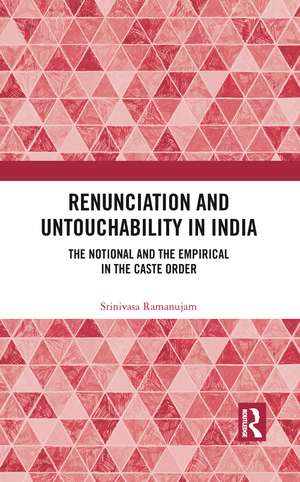Renunciation and Untouchability in India: The Notional and the Empirical in the Caste Order
Autor Srinivasa Ramanujamen Limba Engleză Paperback – 31 mar 2021
An important intervention in the study of caste and untouchability, this book will be an essential read for the scholars and researchers of political studies, political philosophy, cultural studies, Dalit studies, Indology, sociology, social anthropology and Ambedkar studies.
Preț: 389.66 lei
Nou
Puncte Express: 584
Preț estimativ în valută:
74.57€ • 77.95$ • 63.01£
74.57€ • 77.95$ • 63.01£
Carte tipărită la comandă
Livrare economică 07-21 martie
Preluare comenzi: 021 569.72.76
Specificații
ISBN-13: 9780367785987
ISBN-10: 0367785986
Pagini: 186
Dimensiuni: 156 x 234 x 10 mm
Greutate: 0.45 kg
Ediția:1
Editura: Taylor & Francis
Colecția Routledge India
Locul publicării:Oxford, United Kingdom
ISBN-10: 0367785986
Pagini: 186
Dimensiuni: 156 x 234 x 10 mm
Greutate: 0.45 kg
Ediția:1
Editura: Taylor & Francis
Colecția Routledge India
Locul publicării:Oxford, United Kingdom
Public țintă
PostgraduateCuprins
Introduction: Notional Brahmin and The Idea of Original 1. The ‘Ideal’ Brahmin and The Dead Being 2. Physical body and Social body 3. Brahmin Householder as Renouncer 4. Touch-un-ability and ‘Ideal’ Brahmin 5. Translating Touch-un-ability Conclusion: The Dead Being is still Alive
Notă biografică
Srinivasa Ramanujam is a Tamil writer and translator. He has translated and published the collected essays of D.R. Nagaraj, as well as plays of Sundar Sarukkai, and essays by Ashis Nandy, M.S.S. Pandian, Seyyed Hossein Nasr, and Gopal Guru. He is the author of Tharkolaigalai Kondaduvom and Sanyasamum Theendamayum. He was formerly a theatre activist and has directed plays of Bertolt Brecht, Kingsley Bass (Jr.), and Siegfried Lenz.
Recenzii
This book offers a fascinating and complex reading of the conceptual and historical genesis of untouchability and the making of the notion of a brahmin. Rooted in philosophical and textual analysis, the book draws on interesting empirical accounts to offer a nuanced and complex understanding of these processes in relation to the larger structure of caste. Originally published in Tamil, this is a fresh and critical voice that will raise new questions in the study of caste in India.
Sundar Sarukkai
Highlighting the similarity between renounced Brahmin body and dead body; pointing out how the negative state of renouncer becomes an ideal state with Adi Samkara who laid the foundation of a new institute, namely, the Mutt; how subject centred nature of touch-un-ability is untranslatable: These are the novel ideas in the book, and these can both shed a better light and complicate the existing discussions on the reform and radical movement in India.
A. Raghuramaraju
Sundar Sarukkai
Highlighting the similarity between renounced Brahmin body and dead body; pointing out how the negative state of renouncer becomes an ideal state with Adi Samkara who laid the foundation of a new institute, namely, the Mutt; how subject centred nature of touch-un-ability is untranslatable: These are the novel ideas in the book, and these can both shed a better light and complicate the existing discussions on the reform and radical movement in India.
A. Raghuramaraju
Descriere
This volume explores the idea of ‘Brahmin’ and the practice of untouchability by offering a scholarly reading of ancient and medieval texts. It will be an essential read for the scholars and researchers of political studies, political philosophy, cultural studies, Dalit studies, Indology, sociology, social anthropology and Ambedkar studies.
